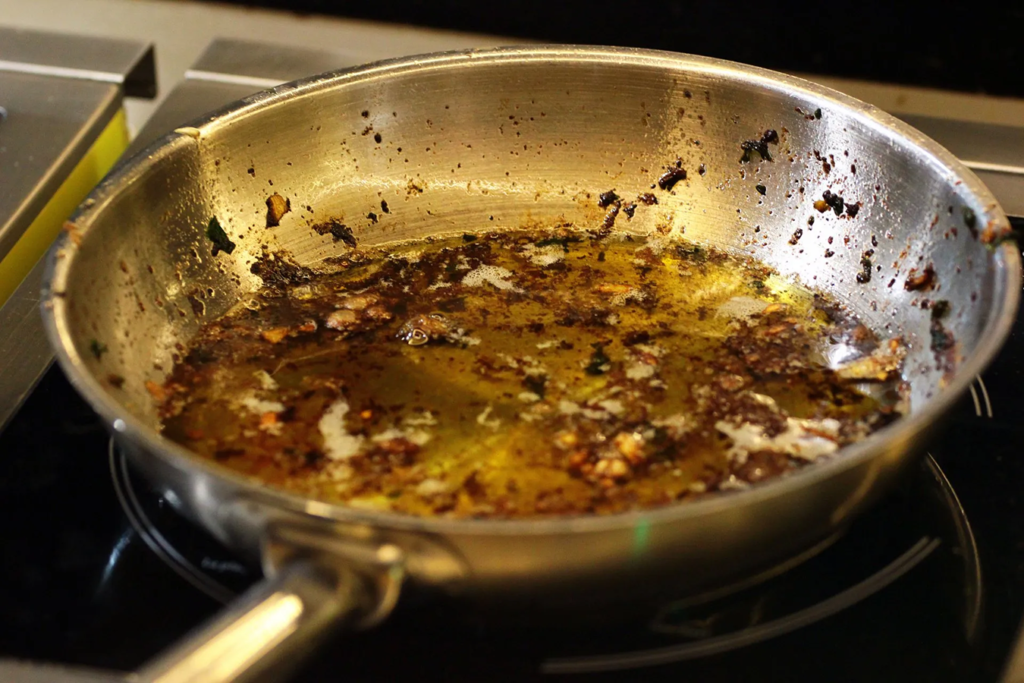It should come as no surprise that clogged pipes happen most frequently during this time of year—I’ve heard that a plumber’s rate triples during holidays.
Grease, oils, and fats may seem innocuous, but they are not.
The kitchen sink is calling to it while it’s liquid. It seems like the simple answer. But even if you blast it with hot water on the way down, the fat, oil, or grease solidifies and adheres to the pipe walls as it cools. If you do this over a sufficient number of holidays, a clogged or, worse, busted pipe will appear when you least expect it. Cheers to a happy Christmas. Children, Santa visited our basement last night because, well, the reindeer needed a toilet break.
The easy solution is to dispose of your fats, oils, and greases appropriately (remember, this is the reason your doctor is urging you to avoid fatty foods).

Without intending to offend, New York City has made the effort to inform its citizens about this crucial practice and has outlawed it.Okay, perhaps it was) to these three simple rules of thumb:
- Transfer your partially cooled fat, grease, or oil into a tightly closed container and dispose of it with your normal waste.
Pouring grease into used food containers (yogurt, margarine, etc.) or even discarded zippered plastic bags are a couple of simple ways to accomplish this. Some use leftover tinfoil to line a bowl, then pour grease into the foil-lined bowl and freeze it. Remove the frozen grease packet and throw it in the trash before garbage day. Just saying, this is not a smart tactic in the heat. Animals stay away from airtight containers. - I always tie up my grease bottle, whatever kind I’m using, in a plastic bag for added security. Use a turkey baster to drain the grease from a huge pan that you are unable to lift or that would be too difficult. In the event that any grease spills, sprinkle some cornstarch over it (creating gravy!) and it will absorb the grease, making cleanup easier and quicker.
- Wipe off your greasy dishes and cookware with a paper towel to remove any remaining fat, oil, or grease before giving them a thorough rinse. Next, carry out your regular washing.
This is a really helpful suggestion since, without realizing it, we gradually fill the system with more debris with every meal. Naturally, don’t do this until everything has cooled. In this case, we wouldn’t use a rag because, first, the fat, oil, or grease wouldn’t come out and, second, it would eventually clog the washing machine. Paper towels are the ideal option for this extremely easy and conscientious step. Crumpled paper napkins that have been cleared off the table can be used if you’re particularly thrifty (it’s all going to end up in the trash anyhow). - Before washing, scrape food leftovers off of plates and cookware; do not run them under the sink.
At the steakhouse where I used to work, we used to dump the mounds of leftover food into a large, oily trash can. The dishwasher would then take out his industrial-strength scraper and remove every last bit of food before putting the dish in the dish pit (yes, for those who don’t work in restaurants, your dishes live and die by the dish pit). It’s a fantastic practice that works well with #2. Put food scraps in the #1 bin if you’re worried about obnoxious animals getting into your trash.
If you smell something coming from your kitchen drains, it’s probably because you’re pouring fat, oil, or grease along with food scraps down the sink. This serves as a polite reminder for you.
This holiday season, you can have a better “flow” and prevent any pipe blockage by adhering to these easy suggestions 🙂
